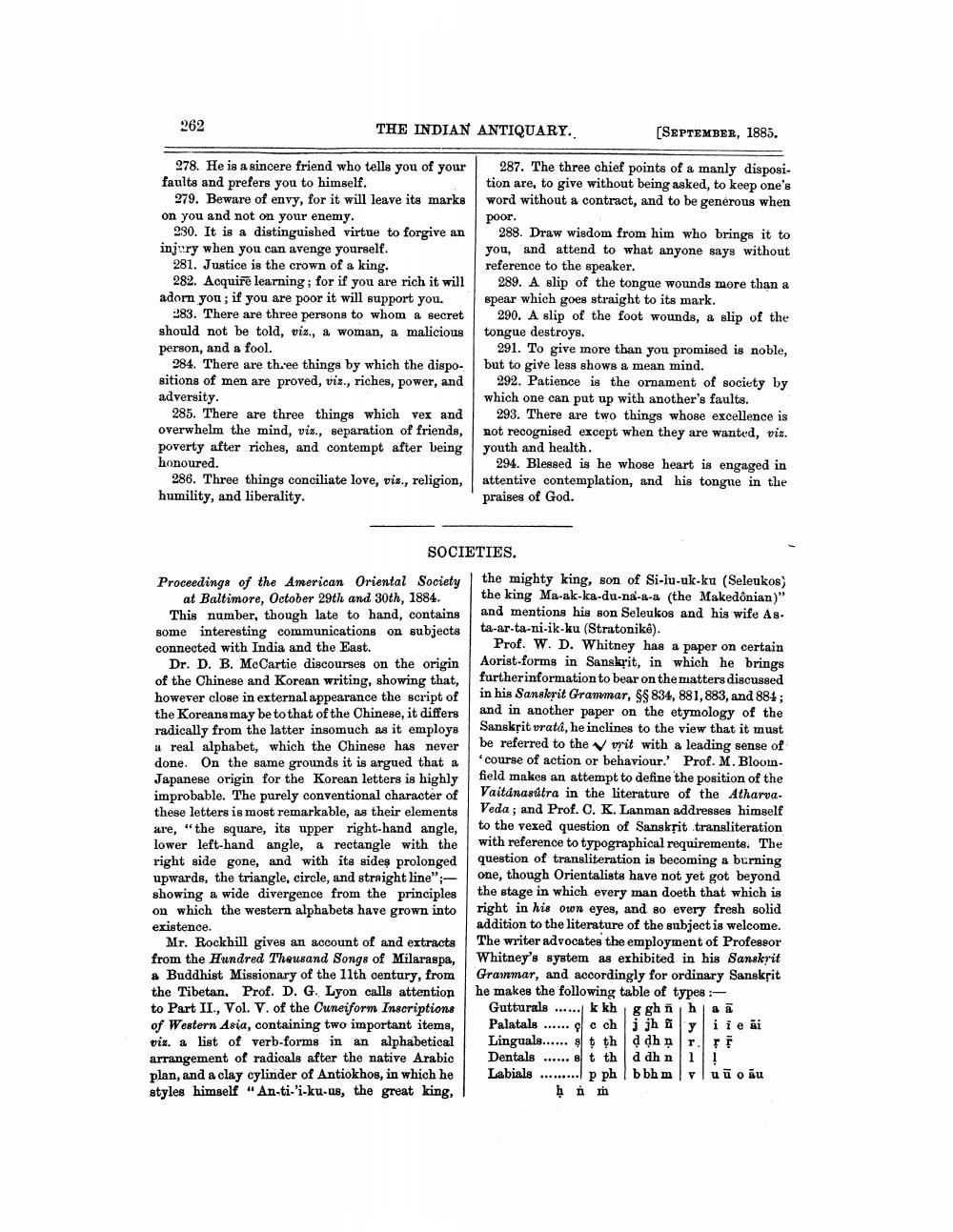________________
262
THE INDIAN ANTIQUARY..
278. He is a sincere friend who tells you of your faults and prefers you to himself.
279. Beware of envy, for it will leave its marks on you and not on your enemy.
230. It is a distinguished virtue to forgive an injury when you can avenge yourself.
281. Justice is the crown of a king.
282. Acquire learning; for if you are rich it will adorn you; if you are poor it will support you.
283. There are three persons to whom a secret should not be told, viz., a woman, a malicious person, and a fool.
284. There are three things by which the dispositions of men are proved, viz., riches, power, and adversity.
285. There are three things which vex and overwhelm the mind, viz., separation of friends, poverty after riches, and contempt after being honoured.
286. Three things conciliate love, viz., religion, humility, and liberality.
Proceedings of the American Oriental Society at Baltimore, October 29th and 30th, 1884. This number, though late to hand, contains some interesting communications on subjects connected with India and the East.
Dr. D. B. McCartie discourses on the origin of the Chinese and Korean writing, showing that, however close in external appearance the script of the Koreans may be to that of the Chinese, it differs radically from the latter insomuch as it employs a real alphabet, which the Chinese has never done. On the same grounds it is argued that a Japanese origin for the Korean letters is highly improbable. The purely conventional character of these letters is most remarkable, as their elements are, "the square, its upper right-hand angle, lower left-hand angle, a rectangle with the right side gone, and with its sides prolonged upwards, the triangle, circle, and straight line";showing a wide divergence from the principles on which the western alphabets have grown into
[SEPTEMBER, 1885.
287. The three chief points of a manly disposition are, to give without being asked, to keep one's word without a contract, and to be generous when
existence.
Mr. Rockhill gives an account of and extracts from the Hundred Thousand Songs of Milaraspa, a Buddhist Missionary of the 11th century, from the Tibetan. Prof. D. G. Lyon calls attention to Part II., Vol. V. of the Cuneiform Inscriptions of Western Asia, containing two important items, viz. a list of verb-forms in an alphabetical arrangement of radicals after the native Arabic plan, and a clay cylinder of Antiokhos, in which he styles himself "An-ti-'i-ku-us, the great king,
poor.
288. Draw wisdom from him who brings it to you, and attend to what anyone says without reference to the speaker.
289. A slip of the tongue wounds more than a spear which goes straight to its mark.
290. A slip of the foot wounds, a slip of the tongue destroys.
291. To give more than you promised is noble, but to give less shows a mean mind.
292. Patience is the ornament of society by which one can put up with another's faults.
293. There are two things whose excellence is not recognised except when they are wanted, viz. youth and health.
SOCIETIES.
294. Blessed is he whose heart is engaged in attentive contemplation, and his tongue in the praises of God.
the mighty king, son of Si-lu-uk-ku (Seleukos) the king Ma-ak-ka-du-na-a-a (the Makedônian)" and mentions his son Seleukos and his wife As. ta-ar-ta-ni-ik-ku (Stratonike).
Prof. W. D. Whitney has a paper on certain Aorist-forms in Sanskrit, in which he brings further information to bear on the matters discussed in his Sanskrit Grammar, §§ 834, 881, 883, and 884; and in another paper on the etymology of the Sanskrit vrata, he inclines to the view that it must be referred to the vrit with a leading sense of 'course of action or behaviour.' Prof. M. Bloomfield makes an attempt to define the position of the Vaitánasútra in the literature of the AtharvaVeda; and Prof. C. K. Lanman addresses himself to the vexed question of Sanskrit transliteration with reference to typographical requirements. The question of transliteration is becoming a burning one, though Orientalists have not yet got beyond the stage in which every man doeth that which is right in his own eyes, and so every fresh solid addition to the literature of the subject is welcome. The writer advocates the employment of Professor Whitney's system as exhibited in his Sanskrit Grammar, and accordingly for ordinary Sanskrit he makes the following table of types :Gutturals. k kh g ghi ha a c ch j jh yiie äi Linguals......t th d dh nr. r Dentals st th d dh n 1! Labials p ph b bh m hǹ m
Palatals
vuu o au




